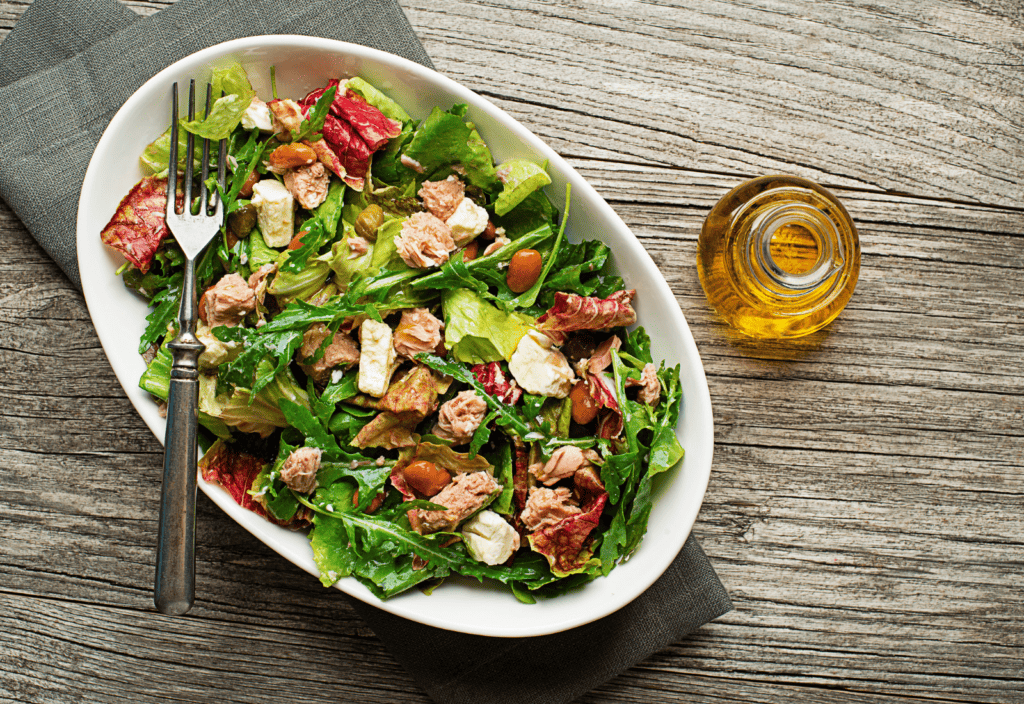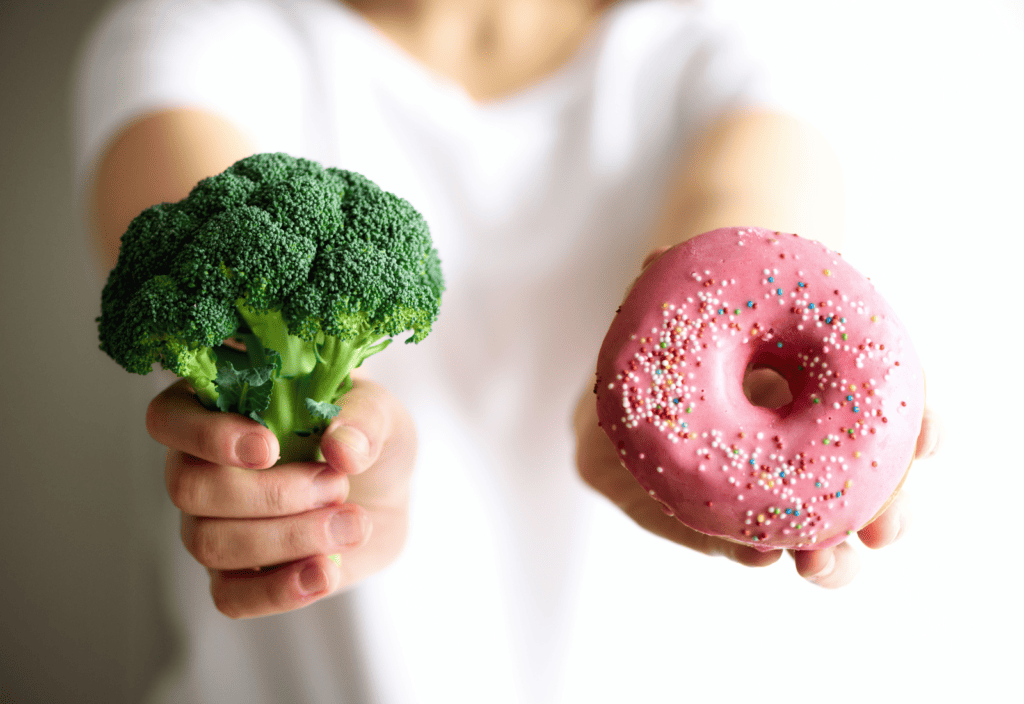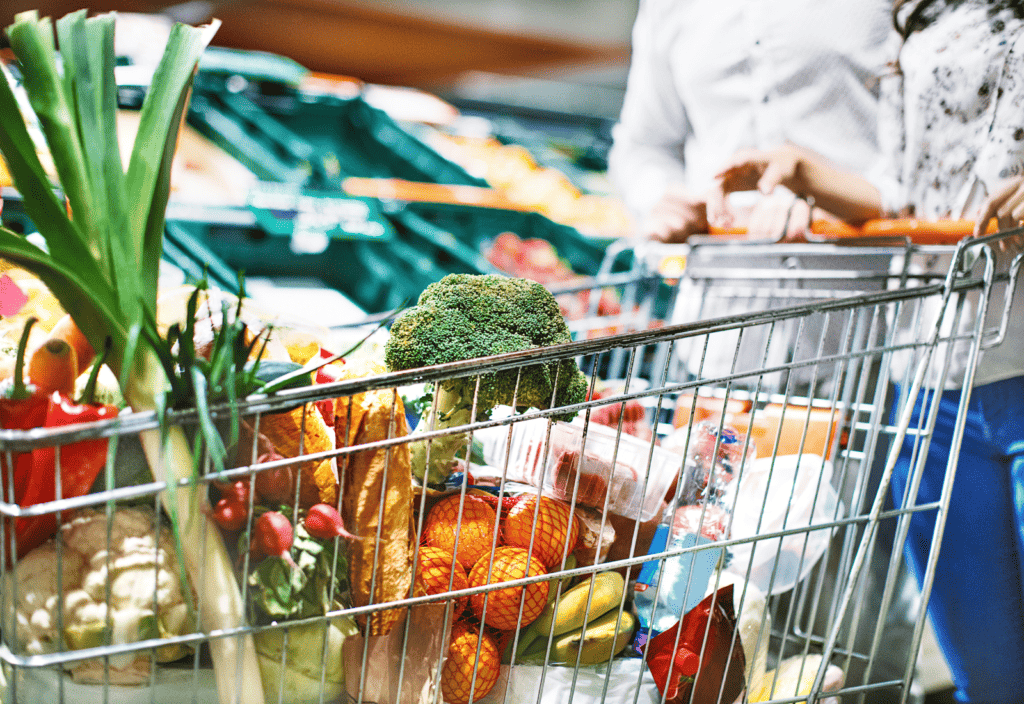While definitions vary somewhat, ultimately clean eating refers to eating whole foods that are minimally processed. In this post, we’ll answer the question, “What Does it Mean to Eat Clean?” and talk about how to get started.

What is Clean Eating?
Clean eating focuses on foods that in their natural state or at least very close. It also means forgoing highly processed foods or ultra-processed foods as they are often referred to.
Cooking food is a form of processing, so it’s not simply the act of processing that’s problematic. Usually, it’s what’s added to the food or taken away during the processing that is the issue.
When you process chips, for example, hydrogenated oils are used, which creates trans-fat. Trans-fat is the type of fat linked to cardiovascular disease. Another example is when you remove the fiber from fruit to make fruit juice. Many foods are healthier in their original form,
A basic clean eating meal is a chicken breast with garlic, salt and pepper seasoning and sides of brown rice and steamed broccoli. If you pour on store-bought BBQ sauce, for example, it will no longer be clean eating as store-bought sauce typically contains lots of preservatives and sugar.
Sugar is a natural sweetener but undergoes a lot of processing to get into the form we use.
At the opposite end of the clean eating spectrum, you will find forms of junk foods like cookies, chips, fast food, etc. These foods are transformed from real/whole foods to food-like substances. They are no longer nutritious and come with a whole heap of dangers.
What are the Benefits of Clean Eating?
You Eat Less/Less Likely to Become Overweight
Processed foods entice you to eat more. This is easy to see when you consider how hard it would be to eat three baked potatoes but how easy it would be to eat a bag of potato chips.
Processed foods are engineered to keep you coming back for more. They are generally carbohydrates, so they don’t leave you feeling full like foods with healthy fats and protein do.
Dr. Jason Fung, author of The Obesity Code and The Diabetes Code, frequently discusses the shift when America moved towards a low-fat diet in the 1970s and 80s and highly processed food production really vamped up.
The change in dietary recommendations was a response to the growing numbers of heart disease, but Dr. Fung believes the low-fat/highly processed food trend actually spurred the obesity epidemic in the U.S. (and other countries).

Dr. Fung suggests that when dietary fat was demonized and carbohydrate consumption increased, people started snacking more since they were hungrier. People were turning to highly processed foods as “healthy choices.”
Afterall, many were low-fat and low calorie … anyone remember Snackwells cookies?
Many studies have linked highly processed food consumption to obesity. Thankfully, many health experts are now giving different advice.
The official dietary guidelines of Brazil, for example, recommends their citizens “limit consumption of processed foods.” We desperately need that recommendation here in the U.S.!
Clean Eating Reduces Your Risk of Cardiovascular Disease
Cardiovascular disease is the leading cause to death worldwide, and nearly half of all U.S. adults have some form. Cardiovascular disease refers to the heart and blood vessels. Studies show that the more processed foods you eat, the more likely you are to develop a cardiovascular disease.
There is a strong link between sugar and cardiovascular disease. Since clean eating omits sugar and processed foods, it can absolutely reduce a person’s risk of developing cardiovascular disease.
You Get More Nutrients with Clean Eating
Getting more nutrients benefits everything. This could be a post of its own. You’ve heard the saying “you are what you eat,” well, it’s true! We are constantly replacing cells (billions per day), and what we eat affects the quality and function of those cells.
Our body needs proper nutrients to function at its best. Think: gut health/digestion, brain health/mood, immunity, etc. As you can imagine, highly processed foods are low in nutrients.
Clean eating incorporates lots of fruits, veggies, healthy fats, lean meats and whole grains, which provide the body with an array of nutrients.
Clean Eating Gives You Superior Immunity
This piggybacks on the last point, but if you have optimal nutrients, your immune system functions better. Post-pandemic research tells us those who had low vitamin D were at greater risk for severe illness. Salmon is a great natural source for vitamin D that fits perfectly into a clean eating diet.

There is also evidence that people with low levels of glutathione are at greater risk of developing serious illness from Covid-19. You can eat foods that support glutathione production such as beef, fish and poultry, broccoli, Brussels sprouts, etc.
Another option is to eat foods naturally rich in glutathione like spinach, avocados, asparagus and okra. In addition, your gut health will be better if you are eating a clean diet. You’ll be naturally cultivating a healthy microbiome while simultaneously avoiding things that damage it.
Clean Eating Improves Mental Health
Clean eating is excellent for mental health. Several studies have linked junk food to increased risk of depression, anxiety and general mental unwellness. By eating a clean diet, you are automatically skipping most foods that have a negative impact on mood like sugar, artificial flavors and colors, cheap cooking oils, etc.
A clean eating diet compared to a highly processed diet contains more omega-3s, more vitamin D and more magnesium, which are widely known for their role in brain health and mood.
Clean Eating Regulates Your Hormones
What we eat affects our hormones in many ways. For starters, food additives, known as xenoestrogens, have been linked to reproductive problems in animal studies. One is propyl gallate, a preservative used to prevent fats and oils from spoiling, and another is 4-hexyl resorcinol, which is used to prevent shrimp, lobsters and other shellfish from discoloring.
Low quality food has the power to raise cortisol levels, one of the three major stress hormones (wow!). Another reason to avoid processed food is that fast food is often packed in materials containing phthalates and bisphenol A (BPA), which are known hormone disruptors.
Clean Eating Gives You More Energy
I you have ever switched from a highly processed diet to clean eating then you know this is true. The most noteworthy difference is that whole food meals containing fat and protein keep blood sugar stable, so you don’t have the big blood sugar spikes and dips that leave us yearning for a nap in the middle of the day.
Whole foods also provide superior nutrition, which naturally increases energy. Whole foods help regulate your appetite, so you tend to stop eating when you are full unlike when we eat highly processed foods like donuts and pizza.
Clean Eating Saves You Money on Groceries
We often think that healthy food is more expensive than fast food or grocery store processed foods, but, if you keep it simple, that’s not true at all. Health food can definitely be expensive, but that’s usually when you overdo it on gourmet health food.

Things like bananas, apples, lettuce, brown rice, chicken, beef, etc. are affordable when compared to the same amount of processed food it takes to fill you up. The key is to keep it simple.
Slice your own veggies, make your own snacks and buy items in large sizes and portion them out yourself (e.g., the quart of yogurt rather than individual-sized).
If you have a Costco near you, see my post on saving money on clean eating at Costco.
Does Clean Eating Have to Be Organic?
Not necessarily. Most clean eaters are likely buying some organic foods, since they are highly conscientious about what goes into their body. It is a good idea to avoid the EWG Dirty Dozen and buy organic when you can, but it is not a requirement.
If you can’t afford to buy organic, you can always include lots of EWG Clean 15 foods in your diet and skip the Dirty Dozen foods. Frozen organic fruits are much cheaper than fresh, so that’s way to enjoy berries, for example, without consuming the nearly 50 pesticides found on conventional berries.
Organic crops are sometimes treated with approved pesticides and can be contaminated from nearby conventional crops, so it doesn’t hurt to do a vinegar rinse on produce even when it’s organic.
Basic Clean Eating Food List
- Protein: natural/antibiotic-free beef and chicken, low mercury seafood, eggs, beans, raw nuts and seeds (beware of added oils and flavorings).
- Fruits and Veggies: any fresh fruit and veggies, frozen fruits or veggies (no additives). If you buy canned fruits and veggies, look for low sodium, no added sugar and a BPA-free liner.
- Whole Grains: rice, lentils, barley, oats, quinoa. Avoid most breads and pastas as these are highly processed. Use almond, oat, coconut flour or similar when baking.
- Dairy: cow’s milk and cheese (if you can tolerate) or goat’s milk/cheese, dairy alternatives like almond, oat and coconut milk (homemade preferred or carefully check labels for fewest additives).
- Fats and oils: olive oil, coconut oil, butter, ghee
- Sweeteners: honey, maple syrup or dates
Resources for Clean Eating
Some of my favorite resources when I got into clean eating were Food Babe, Dr. Mark Hyman and 100 Days of Real Food. These brands differ some, but all offer resources for clean eating enthusiasts including books, cookbooks, podcasts, etc.
What the Heck Should I Eat is a great book if you are diving into clean eating and also interested in eating for metabolic health.
If you shop at Costco or want to start, download my Costco Clean Eating Grocery Guide and take it with you.
Conclusion
So, what does it mean to eat clean? Well, it looks like eating whole foods that your grandmother could have possibly eaten as a child, and it feels like taking control of your health!
If you are looking to implement clean eating for the whole family, be sure to check out my related post “How to Create Real Food Kids in a Goldfish Cracker World.”